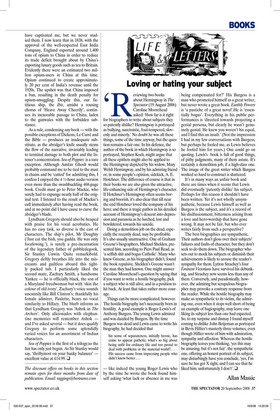Loving or hating your subject
‘Reviewing two books about Hemingway in The Spectator (19 August 2006) Caroline Moorehead asked: ‘How far is it right for biographers to write about subjects they so patently dislike? Hemingway is portrayed as bullying, narcissistic, foul-tempered, slovenly and miserly.’ No doubt he was all these things, some of the time anyway, but the question remains a fair one. In his defence, the author of the book in which Hemingway is so portrayed, Stephen Koch, might argue that all these epithets might also be applied to the Hemingway depicted by his widow, Mary Welsh Hemingway, and by his admiring friend or, in some people’s opinion, sidekick, A. E. Hotchner. The difference of course is that in their books we are also given the attractive, life-enhancing side of Hemingway’s character. If Hotchner’s Hemingway often seems boring and boorish, it’s also clear that till near the end Hotchner loved the company of his hero; and there is tragic pathos in his detailed account of Hemingway’s descent into depression and paranoia as he lurched, lost and bewildered, towards his suicide.
Doing a demolition job on the dead, especially the recently dead, may be profitable. It’s also usually unattractive. One of Graham Greene’s biographers, Michael Shelden, presented him, according to Piers Paul Read, as ‘a selfish shit and bogus Catholic’. Many who knew Greene, as his biographer didn’t, found the book repulsive. Shelden’s Greene wasn’t the man they had known. One might answer Caroline Moorehead’s question by saying that if you want to write a hostile biography, pick a subject who is still alive, and in a position to hit back. At least that takes rather more courage.
Things can be more complicated, however. The hostile biography isn’t necessarily born in hostility. A good example is Roger Lewis’s of Anthony Burgess. The young Lewis admired and was dazzled by Burgess. By the time Burgess was dead and Lewis came to write his biography, he had decided that
his sense of separateness, initially heroic, has come to appear pathetic; what’s so big about being unfit for ordinary life and too proud to deal with problems in the material world?. . . .
His success came from impressing people who didn’t know better . . .
— like indeed the young Roger Lewis who by the time he wrote the book found himself asking ‘what lack or absence in me was being compensated for?’ His Burgess is a man who promoted himself as a great writer, but never wrote a great book. Earthly Powers is ‘a pastiche of a great novel’.He is ‘essentially bogus’. Everything in his public performances is ‘directed towards projecting a genial persona, but clearly he wasn’t genuinely genial. He knew you weren’t his equal, and I find this an insult.’ (Not the impression I had in my few conversations with Burgess, but perhaps he fooled me, as Lewis believes he fooled him for years.) One could go on quoting. Lewis’s book is full of good things, of pithy judgments, many of them astute. It’s certainly a demolition job, if a high-class one. The image of the great writer which Burgess worked so hard to construct is shattered.
It’s in many ways an unfair book and there are times when it seems that Lewis did eventually ‘patently dislike’ his subject. Perhaps for this reason it shouldn’t have been written. Yet it’s not wholly unsympathetic, because Lewis himself as well as Burgess is the subject, and it’s a record of his disillusionment, bitterness arising from a love and hero-worship that have gone wrong. It may not be fair, but who ever writes fairly from such a perspective?
The best biographies are sympathetic. Their authors don’t gloss over their subjects’ failures and faults of character, but they don’t seek to do them down. The biographer who sets out to mock his subjects or diminish their achievements is likely to arouse the reader’s sympathy for them. Lytton Strachey’s four Eminent Victorians have survived his debunking, and Strachey now seems less than any of them. Conversely, and paradoxically, however, the admiring but scrupulous biographer may provoke a contrary response from the reader. While the hostile biography may make us sympathetic to its victim, the admiring one, even when it stops well short of being an example of hagiography, may leave one liking its subject less than one had expected. So, to my surprise and dismay I found myself coming to dislike John Betjeman as portrayed in Bevis Hillier’s masterly three volumes, even though Hillier wrote of him with admiration, sympathy and affection. Whereas the hostile biography leaves you thinking, ‘yes this may be amusing, but it’s not fair’, the sympathetic one, offering an honest portrait of its subject, may disturbingly have you conclude, ‘yes, I’m sure he has got X right, and I can see that he liked him; unfortunately I don’t’. ❑
Allan Massie










































































 Previous page
Previous page